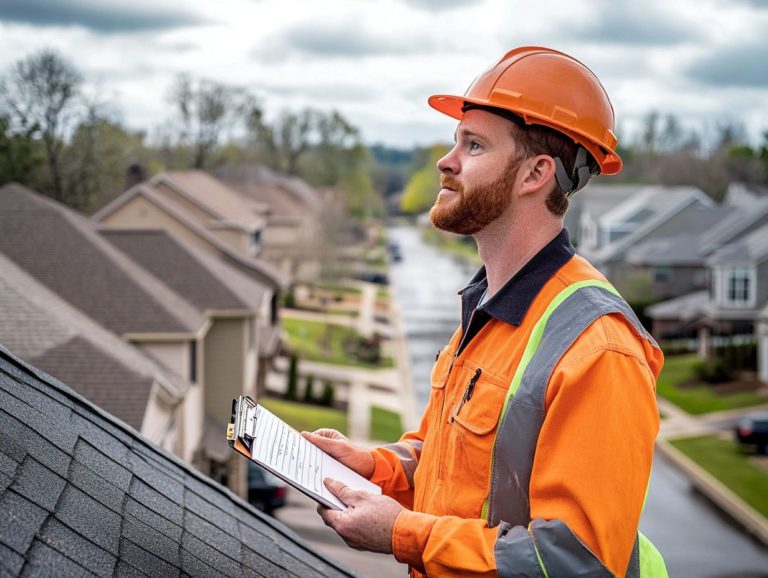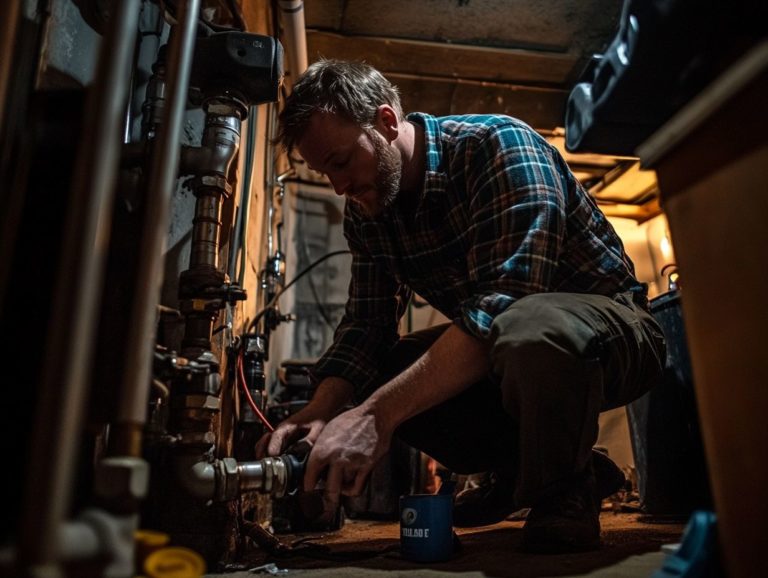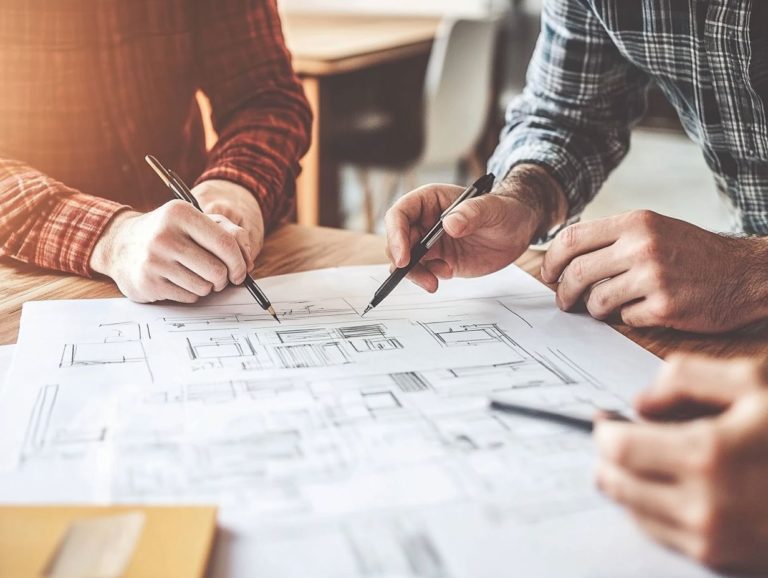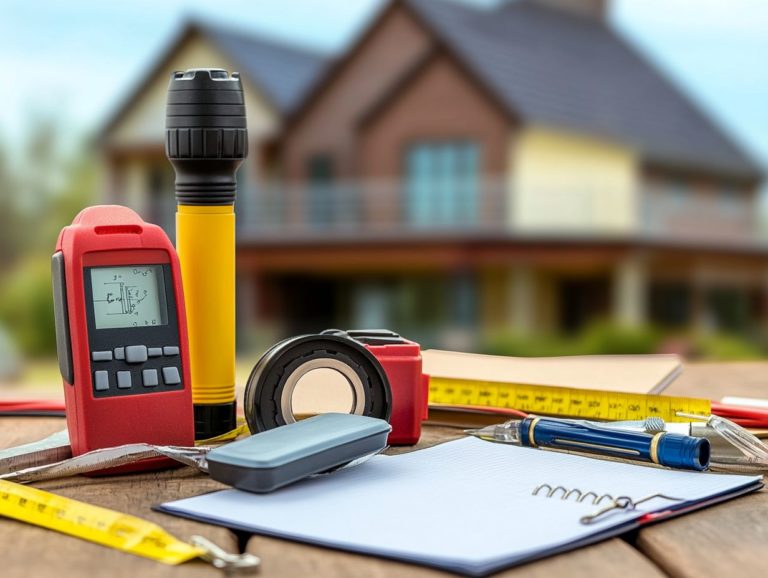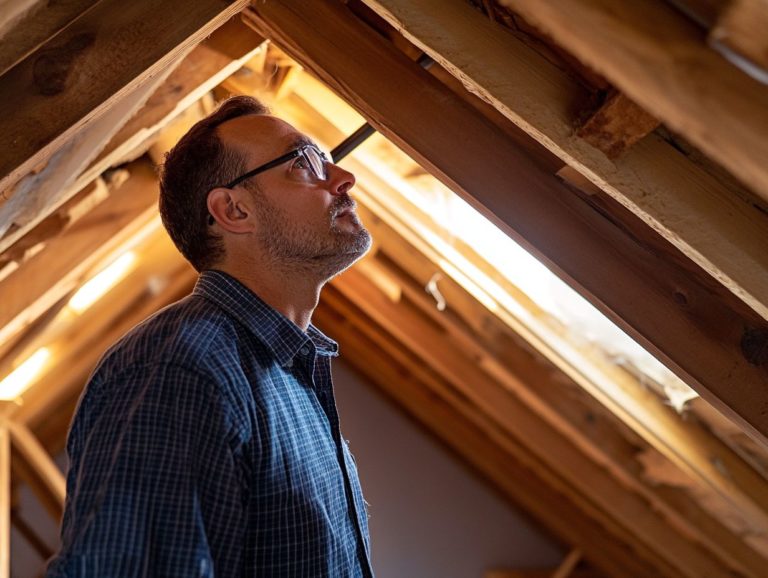Home Inspection Myths Debunked
When you embark on the journey of buying or selling a home, understanding the details of home inspections is essential. Unfortunately, a haze of misconceptions often obscures the true nature of what a home inspection involves.
This article aims to clear the air by debunking prevalent myths about home inspections, highlighting their importance, and guiding you on how to prepare effectively. It also offers insightful tips for selecting the right home inspector, ensuring your transaction proceeds seamlessly.
Whether you’re a first-time buyer or a seasoned seller, this knowledge is invaluable in empowering you to make well-informed decisions.
Contents
- Key Takeaways:
- Common Myths about Home Inspections
- The Importance of Home Inspections
- Preparing for a Home Inspection
- Choosing a Home Inspector
- Frequently Asked Questions
- What are some common home inspection myths?
- Is a home inspection really necessary?
- Do I need a home inspection for new construction?
- Can I rely on my own DIY inspection instead of hiring a professional?
- Will an inspection report guarantee that there are no issues with the property?
- Do sellers need to disclose home inspection reports to potential buyers?
Key Takeaways:

Home inspections are a crucial part of the home buying process and should not be overlooked or dismissed based on common myths. It is important to understand the truth behind misconceptions about home inspections in order to make informed decisions and ensure the safety and quality of your future home. Proper preparation and choosing a qualified home inspector are key factors in ensuring a successful and thorough home inspection.
What is a Home Inspection?
A home inspection is your comprehensive visual examination of a property’s condition, typically conducted by a certified home inspector. They assess various aspects, including the structure, electrical systems, plumbing, and HVAC systems (heating, ventilation, and air conditioning), to provide you with an unbiased evaluation of the home’s safety and compliance with building codes.
This detailed assessment informs you about existing concerns and aids appraisers in determining the home’s market value, ensuring it meets safety standards.
During the inspection process, the inspector meticulously checks for plumbing leaks that could signal larger issues, evaluates the structural integrity of beams and foundations, and assesses the condition of the roofing and insulation.
This thorough assessment gives you the knowledge you need to understand immediate maintenance responsibilities and potential costs for future repairs. By highlighting critical areas requiring attention, such as outdated electrical systems or insufficient drainage, the home inspection report becomes an invaluable tool for negotiating repairs or price adjustments.
Ultimately, it gives you the power to make informed decisions about your investment, ensuring peace of mind during this significant transaction.
Common Myths about Home Inspections
Don’t let myths cloud your judgment! Despite the crucial role that a professional home inspection plays in the home buying process, several prevalent myths can mislead you, especially if you’re a first-time buyer.
These misconceptions may lead you to misunderstand the inspection’s true purpose and scope, potentially resulting in costly oversights in your home maintenance and renovation projects.
Debunking Misconceptions
Many home buyers often fall victim to misconceptions about home inspections, such as the belief that they cover every possible defect or that they are unnecessary for new constructions. This can lead to significant property evaluation issues and the potential oversight of critical safety concerns.
Understanding what a home inspection truly entails is essential for making informed decisions. For instance, it’s important to recognize that while inspectors assess structural integrity, roofing, and systems like plumbing and electrical, they typically do not investigate code compliance (ensuring the home meets safety regulations) or issues concealed behind walls.
To dispel these misunderstandings, you should consider using an inspection checklist that highlights key areas to examine, including:
- The foundation
- Gutters
- HVAC systems
Enlisting the expertise of a seasoned inspector can provide you with a thorough and accurate assessment, safeguarding both your investment and your well-being.
The Importance of Home Inspections

Home inspections are essential in the real estate market, acting as a vital safeguard for you as a home buyer.
They protect your investment and offer crucial insights into the property’s condition, significantly impacting your decisions during home sales and negotiations about resale value.
Why Home Inspections are Necessary
Home inspections are essential for prospective buyers. They provide a thorough assessment of the property.
Inspections uncover hidden issues, such as plumbing leaks or electrical problems, empowering you to make informed decisions and understand your future maintenance responsibilities.
Beyond potential hazards, these inspections are vital for identifying structural issues, like foundation cracks or roof damage, which could lead to significant expenses later on. When you’re aware of these issues, you gain the upper hand in negotiations, allowing you to secure better deals or budget for necessary repairs, ultimately protecting your investment.
Understanding the long-term maintenance needs of homeownership is invaluable. A detailed inspection report provides you with a roadmap of what to monitor and maintain, helping you prioritize repairs and upgrades. This thoughtful approach enhances your property’s value and ensures its longevity.
Preparing for a Home Inspection
Preparing for a home inspection is essential whether you’re buying or selling.
It’s about grasping the inspection process, knowing what to anticipate, and using a comprehensive checklist to ensure that every area of concern is addressed and evaluated.
This preparation not only builds your confidence but also paves the way for a smoother transaction.
What to Expect and How to Prepare
During a home inspection, you can expect a comprehensive evaluation conducted by a seasoned inspector. They will assess various systems, including plumbing, electrical, and HVAC (heating, ventilation, and air conditioning), while addressing essential maintenance responsibilities that may arise post-purchase.
This process usually includes a detailed walkthrough of the home, where the inspector identifies existing issues and offers valuable insights into the expected lifespan of critical components. It’s important to take notes and ask questions to fully grasp any concerns that might impact your future living experience.
Recognizing that understanding maintenance responsibilities is crucial can save you from unexpected expenses in the future. Knowing which systems require regular upkeep is key.
To maximize the effectiveness of this evaluation, proper preparation before the inspection is essential. Reviewing seller disclosures and compiling a list of specific concerns can enhance your experience and equip you with the knowledge you need.
Choosing a Home Inspector

Choosing the right home inspector is crucial for you as a home buyer. By opting for a certified professional who follows established inspection standards, you can guarantee a comprehensive and precise evaluation of the property.
This diligent approach safeguards your interests and helps you navigate potential pitfalls in your investment.
Factors to Consider
When selecting a home inspector, several key factors deserve your attention. Consider the inspector’s certification, their level of experience, and their commitment to industry standards. These elements are crucial for ensuring a reliable property evaluation and providing you peace of mind as a home buyer.
It’s wise to research the inspector s reputation within the community. Look for reviews and testimonials that reflect previous clients’ experiences. This can offer valuable insights into their reliability and professionalism.
Additionally, confirm that the inspector carries adequate insurance. This not only protects them but also safeguards you against unforeseen issues that might arise during the inspection process.
Inquiring about the tools and technology they use can shed light on the thoroughness of their inspection process. Finally, open communication is essential. A qualified inspector should be eager to address your concerns and explain their findings clearly, ensuring you re fully informed before making such a significant investment.
Frequently Asked Questions
What are some common home inspection myths?
Many believe inspections are only for older homes, but they are crucial for new homes as well. A thorough inspection reveals hidden issues regardless of age. Other myths include the notion that inspections are a waste of money or only necessary for buyers, not sellers.
Is a home inspection really necessary?

Yes, a home inspection is essential. It keeps your home safe and working well. Plus, it can save you money by spotting problems before they escalate.
Do I need a home inspection for new construction?
Absolutely! A home inspection for new constructions is crucial. It helps identify any construction faults that may have been missed during the building process.
Can I rely on my own DIY inspection instead of hiring a professional?
No, it’s best to hire a professional for an unbiased assessment. They have the training to spot issues you might overlook.
Will an inspection report guarantee that there are no issues with the property?
No, an inspection report cannot guarantee a problem-free property. However, it offers valuable insights to help you make an informed buying decision.
Do sellers need to disclose home inspection reports to potential buyers?
This varies by state and local laws. In many areas, sellers must disclose known issues, including those found in home inspection reports. Always consult a real estate agent or lawyer for the specifics.

